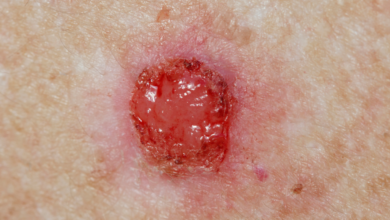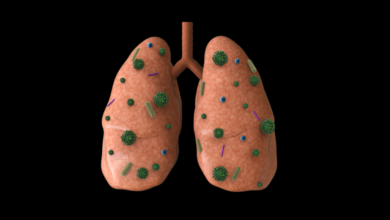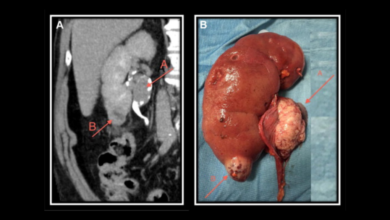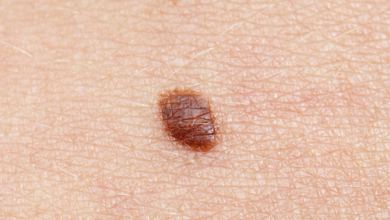Soft Tissue Sarcoma: A Rare Cancer
Soft Tissue Sarcoma: Causes, Symptoms, and Treatment

What is Soft Tissue Sarcoma?
Soft tissue sarcoma is a rare type of cancer that develops in the soft tissues of the body, such as muscle, fat, blood vessels, nerves, and fibrous tissues.
Types of Soft Tissue Sarcoma
There are many different types of soft tissue sarcoma, each arising from a specific type of soft tissue. Some common types include:
• Liposarcoma: Arises from fat cells.
• Leiomyosarcoma: Arises from smooth muscle cells.
• Rhabdomyosarcoma: Arises from skeletal muscle cells.
• Fibrosarcoma: Arises from fibrous tissues.
• Synovial sarcoma: Arises from the tissues around joints.
Symptoms of Soft Tissue Sarcoma
Symptoms of soft tissue sarcoma can vary depending on the location and type of the tumor. However, some common symptoms include:
• A painless lump or mass under the skin
• Pain or tenderness in the affected area
• Swelling
• Difficulty moving the affected area
Causes of Soft Tissue Sarcoma
The exact causes of most soft tissue sarcomas are unknown. However, certain factors may increase the risk, such as:
• Exposure to radiation: Exposure to high doses of radiation can increase the risk.
• Certain genetic conditions: Some genetic conditions, such as Li-Fraumeni syndrome, can increase the risk.
• Immune system disorders: Certain immune system disorders can increase the risk.
Who Can Suffer from Soft Tissue Sarcoma?
Anyone can develop soft tissue sarcoma, but it is more common in adults.
Diagnostic Tests for Soft Tissue Sarcoma
To diagnose soft tissue sarcoma, a doctor may use a combination of tests, including:
• Physical exam: To check for any lumps or abnormalities.
• Imaging tests: CT scans, MRIs, and PET scans can help visualize the tumor and determine its extent.
• Biopsy: A small tissue sample is removed and examined under a microscope to confirm the diagnosis.
Stages of Soft Tissue Sarcoma
The staging of soft tissue sarcoma helps determine the extent of the disease and guides treatment decisions. The most common staging system is the TNM system, which considers the size of the tumor (T), the spread to nearby lymph nodes (N), and the presence of distant metastases (M).
Treatment of Soft Tissue Sarcoma
The treatment for soft tissue sarcoma depends on the stage and type of cancer, as well as the patient’s overall health. Common treatment options include:
• Surgery: To remove the tumor and surrounding tissue.
• Radiation therapy: To kill cancer cells with high-energy rays.
• Chemotherapy: To kill cancer cells throughout the body.
• Targeted therapy: To target specific molecules involved in cancer cell growth.
Diet and Soft Tissue Sarcoma Prevention
While a healthy diet can contribute to overall health and may reduce the risk of certain cancers, there isn’t a specific diet that can directly prevent soft tissue sarcoma. However, maintaining a balanced diet can support the immune system and overall health.
Here are some general dietary recommendations:
• A balanced diet: A diet rich in fruits, vegetables, whole grains, and lean proteins can help.
• Limit processed foods and sugary drinks: These can contribute to weight gain and other health problems.
• Maintain a healthy weight: Obesity is linked to an increased risk of certain cancers.
Overall Survival Rate of Soft Tissue Sarcoma
The overall survival rate for soft tissue sarcoma varies depending on the type, stage, and location of the tumor, as well as the patient’s overall health. Early detection and timely treatment significantly improve the prognosis.
Doctor to Consult
An orthopedic oncologist or a medical oncologist is the best doctor to consult for soft tissue sarcoma.
Diseases Associated with Soft Tissue Sarcoma
Soft tissue sarcoma is not directly associated with other specific diseases. However, certain genetic conditions can increase the risk of developing soft tissue sarcoma.
How to Prevent Soft Tissue Sarcoma
While there’s no guaranteed way to prevent soft tissue sarcoma, maintaining a healthy lifestyle can reduce the risk of certain cancers. Here are some tips:
• Limit exposure to radiation: Excessive exposure to radiation can increase the risk of certain cancers.
• Avoid smoking: Smoking is a major risk factor for various cancers.
• Maintain a healthy weight: Obesity can increase the risk of certain cancers.
• Regular check-ups: Regular check-ups can help detect any abnormalities early on.





